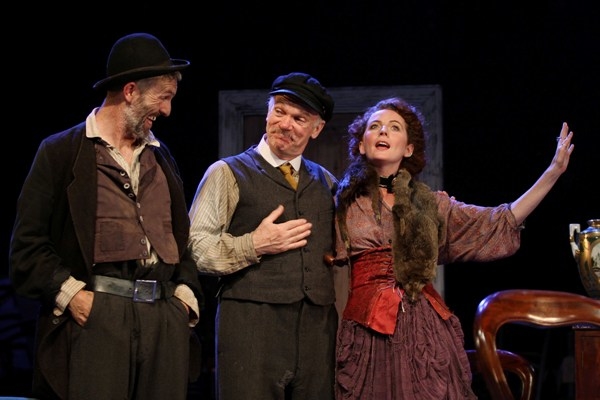Juno and The Paycock (Bristol Old Vic)
Juno and The Paycock is impressively staged though it doesn’t quite hit the tragic high notes at Bristol Old Vic

© Stephen Vaughan
Gemma Bodinetz‘s production of Sean O’Casey’s masterpiece of poverty in a Dublin tenement, Juno And The Paycock, seems to have focused on the tragic over the comedic. It’s a rough, scrappy world summed up in Conor Murphy‘s set with discarded tables and chairs stacked up at the back in resemblance to a barricade, when a suitor is spurned violence feels probable, when the ensemble break into song they’re tinged with melancholy rather then joy.
Its the story of the Boyle family who think they find a route out of poverty in the will of a cousin but find these hopes cruelly dashed. Des McAleer as the partiach Captain Jack Boyle and Louis Dempsey as Joxer provide one of theatres most enduring double acts, a vaudeville of drink, laziness and bon viveur. The biggest betrayal in this production feels like that of the friendship between these men, as the treacherous Joxer fingers the possesions of the house as his promised money doesn’t arrive. McAleer’s is a brilliant performance, he has a knack of flicking between the cheeky Irish barmy and a temper that tells us he is not a man not to be crossed. When he banishes his daughter from the house we believe that if he comes into contact with her GBH is a distinct possibility.
Bodinetz has sculpted the production in highly theatrical ways with an ever watching chorus who play instruments and sing songs and Natasha Chiver’s stunning lighting design emphasises the theatricality; it’s a design of dreams and nightmares, blue tinged and long shadows that stretch out into the depths of the stage. She has also brought a number of strong performances from her cast. Robin Morrisey towers over the others physically as his Englishness does the same to a family that are took in by his more refined ways before he abandons them, Donal Gallery is impassioned as the ex-nationalist son of the family, wounded and destined to meet a bloody end and Aoife McMahon is the vivacious widow who turns vicious when she comes calling for her debt.
Niamh Cusack as Juno is a more muted presence. She is a women that things happen to rather then makes happen. She allows the other characters their moment in the spotlight, she is the one ready to pick up the pieces when their dreams crumble. Even her climatic choice to leave her husband feels like something that may be flipped tomorrow. Due to this, the tragic ending feels as muted as her act. The comedy works best because the play focuses on the paycock of the title at the expense of the Juno.
It’s a minor quibble in a play that immerses us brilliantly in its rough tenament. Its next stop will travel to Liverpool and Juno is hopefully an impressive first step in a fruitful relationship between these two regional powerhouses.
Juno and The Paycock plays at BOV until the 27th September and then Liverpool Playhouse from the 1st-18th October.












